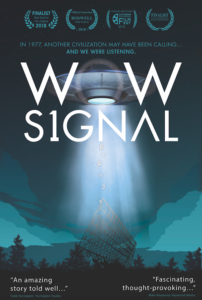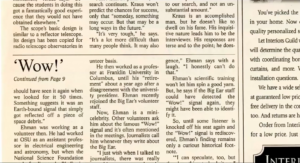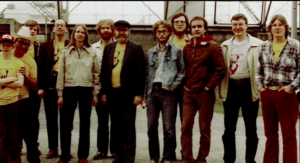 The old joke around the search for alien life goes, “‘is there intelligent life out there?’ I don’t even know if there’s intelligent life down here on Earth!” Nyuck nyuck, rimshot, slide whistle, tip your waitresses, try the veal. It was probably a really tired bon mot when John Kraus designed the Ohio State University “Big Ear” radio telescope to scan the skies in the mid-1950s.
The old joke around the search for alien life goes, “‘is there intelligent life out there?’ I don’t even know if there’s intelligent life down here on Earth!” Nyuck nyuck, rimshot, slide whistle, tip your waitresses, try the veal. It was probably a really tired bon mot when John Kraus designed the Ohio State University “Big Ear” radio telescope to scan the skies in the mid-1950s.
But in 1977, the joke was put to rest when that telescope recorded a narrow-band signal thirty times stronger than the background radiation, coming from somewhere in the constellation Sagittarius: a 72-second burst of radio waves that proved, once and for all, that there is intelligent life—well, “out there,” at least.
Or did it?
Bob Dawson’s Wow Signal examines that eponymous transmission, and the Search for Extraterrestrial Intelligence (SETI) which carries on its legacy in places like the Green Bank Observatory. Interviewing believers and skeptics alike, the show deftly and simply explains the “Wow! Signal:” not only the astronomical and mechanical science of its nature and detection, but the culture of listening for aliens that the signal jump-started in the late 1970s.
The film is balanced and tells a compelling story about this signal from the stars, along with the people and technology that found it; it features interviews with colorful, smart, and fascinating people, asks important questions about our universe, and pushes us into a discussion of some very hard concepts: are there other intelligent beings in the universe? How would we know if there were? What would a message from aliens look like?
While the film struggles with pacing and overuses stock footage at points, its position on SETI (though clear) is rarely delivered with the fervence it deserves, and Dawson’s voiceover narration feels at times like the sort of narration you might hear in a classroom or museum video, to be honest, that sort of thing is totally my jam; and the questions it raised were exactly the sorts of questions I like to think about.
One in particular: why is it that we so desperately need to not be alone?
Detection of the “Wow! Signal” was a revelation for some and a complete nonissue for others, but nobody can deny that it was compelling. And the questions raised by the SETI project go beyond the question of the “Wow! Signal” and cut straight to the heart of what it means to be a human.
Hope, Out There
“Human beings love to wonder why…other beings out there in the universe is just so tantalizing, so exciting to think that there’s something else out there, we’re not alone.”
—Karen O’Neil, Director, Green Bank Observatory
Why is the idea of extraterrestrial intelligence so “tantalizing?” It seems to me that the biggest answer is hope; but that simple world holds multitudes. Hope in what?
 Maybe it’s a hope that we can survive in this universe. It’s a tough existence, and as far as we can tell, life is tough everywhere. Knowing that it’s possible for that civilization to survive, to not destroy itself, long enough to be heard by us? That means that it’s possible for us to survive, to not destroy ourselves, long enough to be heard by others. It means that, just maybe, there actually is intelligent life down here. Knowing that life is possible is not only tantalizing, it’s crucial; if we don’t have the hope to go on, we simply won’t.
Maybe it’s a hope that we can survive in this universe. It’s a tough existence, and as far as we can tell, life is tough everywhere. Knowing that it’s possible for that civilization to survive, to not destroy itself, long enough to be heard by us? That means that it’s possible for us to survive, to not destroy ourselves, long enough to be heard by others. It means that, just maybe, there actually is intelligent life down here. Knowing that life is possible is not only tantalizing, it’s crucial; if we don’t have the hope to go on, we simply won’t.
Or maybe, more darkly, we have a maudlin hope that we can live on in the memories of others. If we get wiped out by an asteroid (or by our own petty squabbles), will the universe ever even remember that we were here? At the core of being human is a fervent need to be known, and that’s true for us as a species just as much as individuals. We need to be known, and who else is out there to know us in the galaxy at large? If we can contact others, we can at least tell them who we are and what we’re like. We can live on, even if we die.
Perhaps we look up with hope that someone outside of us can come and save us. We see this played out in our culture most visibly through the story of Superman, and though the narrative term for a sudden, unexpected salvation is deus ex machina, the popular conception has it coming, not from a machine, but from above. And though that narrative conceit can be maligned and looked down on as a hacky way of writing, who wouldn’t welcome it if it saved us in our hour of need?
But perhaps we look to the “Wow! Signal” with hope that the transcendent can transform us. The brightest sci-fi stories often begin with this premise; Star Trek: First Contact, for instance, shows the end of all war and strife on Earth when the Vulcans touch down in Bozeman, Montana. First contact changes who we are and makes us better; maybe not right away, but eventually. Knowing that we’re not the end-all or be-all of the universe can inspire us to move beyond the petty squabbles of life on this planet and live for something bigger.
 I believe that this hope is no accident. We’re created to hope; just like we’re created to tell stories, as surely as we’re made to be in community with one another, certain as the sun rises in the East.
I believe that this hope is no accident. We’re created to hope; just like we’re created to tell stories, as surely as we’re made to be in community with one another, certain as the sun rises in the East.
And yes; that hope in our hearts isn’t meant to point us to space aliens, but to God. It tells us about who He is; God perfectly fulfills our hope for survival, our hope to be known, our hope to be saved, and our hope to be transformed.
But that hope also tells us something crucial about us as humans. It’s the same reason we gravitate toward movies like Wow Signal. Because, no matter how tenuous or tentative the hope, if it does not betray us, hope can be enough to keep us going. Hope can be enough to push us forward, to change us, to save us.
Whether it’s on Earth or up above.
• •
Reel World Theology received a review copy of Wow Signal from TriCoast Worldwide. The film arrives today on all major digital platforms.

1 comment